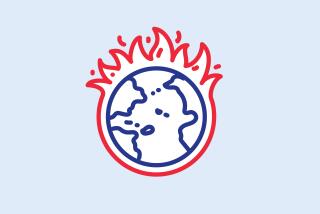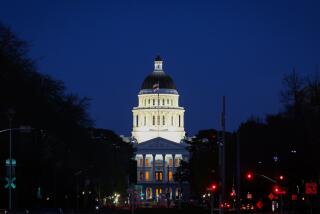$18.5-Billion State Transit Program OKd
SACRAMENTO — Negotiators for the Legislature and Gov. George Deukmejian agreed Tuesday on an $18.5-billion, 10-year transportation improvement program that will require a 9-cents-a-gallon hike in the gasoline tax.
Emerging from a four-hour bargaining session, smiling negotiators said they had reached a consensus on all the major issues involved in the politically sensitive task of designing a mammoth spending program for upgrading the state’s highways and transit systems. The plan is contingent upon voters significantly altering the state spending limit.
“There are no outstanding issues that I think have the potential to scuttle this agreement,” said Michael Frost, Deukmejian’s chief of staff.
The agreement called for additional spending to reduce urban congestion, improve rural roads and highways, enlarge mass transit systems, repair deteriorating freeways, complete new road projects delayed by funding shortages and even plant trees along urban highways.
It provides for the spending program to be financed by the gas tax increase, a substantial hike in truck weight fees and a $3.5-billion bond issue for mass transit. The bonds would also have to be approved by the voters.
The agreement represents the culmination of weeks of intense behind-the-scenes negotiations between Deukmejian’s staff and Democratic and Republican leaders from both legislative houses who specialize in transportation matters. It is the first of several interwoven spending issues to be resolved by the negotiators.
“We now know each other a lot better, and we don’t like each other,” joked Sen. William Campbell (R-Hacienda Heights).
Other teams of negotiators are still wrestling with proposals to modify the state’s spending limit and to alter Proposition 98, the voter-approved initiative that dictates the amount of state revenue to be allocated to schools.
Without modifications in the spending limit, the state could not spend the additional revenue raised by the transportation plan. The changes in Proposition 98, while not directly linked to the transportation issue, are needed to resolve a political dispute over how the state should spend any surplus. Failure to resolve the surplus question could jeopardize the transportation plan.
“The whole thing has to fit together,” said Assemblyman Richard Katz (D-Sylmar), chairman of the Assembly Transportation Committee.
But there is strong bipartisan support for the transportation plan, and the momentum generated by Tuesday’s agreement is expected to provide a powerful incentive for lawmakers to come to terms on the other fiscal issues.
Before the transportation plan reaches the voters for final approval, it will have to be ratified by the Legislature and the governor. However, Senate and Assembly leaders, as well as Deukmejian, have already indicated that they would endorse whatever proposal is produced by the negotiators.
The only elements of the transportation plan that remain to be worked out, Katz said, are proposals to increase truck weight fees and a determination of whether proposed modifications to the spending limit should be placed on a November, 1989, ballot or a June, 1990, ballot. There was agreement that the truck fees would be raised; the only question is how much.
At earlier sessions, the negotiators agreed that the gas tax increase should be approved by the Legislature but should not go into effect unless voters endorse changes in the spending limit.
The negotiators said it has not been determined yet exactly how voters will be advised that a vote to approve the spending limit changes would also trigger a gas tax increase.
“But we are all committed to the fact that the voters know exactly what they’re voting on . . . that there will be a gas tax increase,” Katz said.
The gas tax increase agreed to by the negotiators provides for an immediate 5-cents-a-gallon hike to be followed by 1-cent increases each year for the following four years. California motorists already pay 9 cents a gallon in state taxes and another 9 cents in federal taxes.
The Senate recently approved a 10-cent-a-gallon increase and the Assembly a 5-cent increase that would be gradually increased over the next decade, according to a formula based on inflation. Both legislative houses are now expected to adopt the 9-cent increase that had been suggested by Deukmejian and agreed to by the negotiators.
The negotiators made no determination on specific projects that would be funded with the new gas tax revenue. That would be determined by state and local officials based on need.
More to Read
Get the L.A. Times Politics newsletter
Deeply reported insights into legislation, politics and policy from Sacramento, Washington and beyond. In your inbox three times per week.
You may occasionally receive promotional content from the Los Angeles Times.









